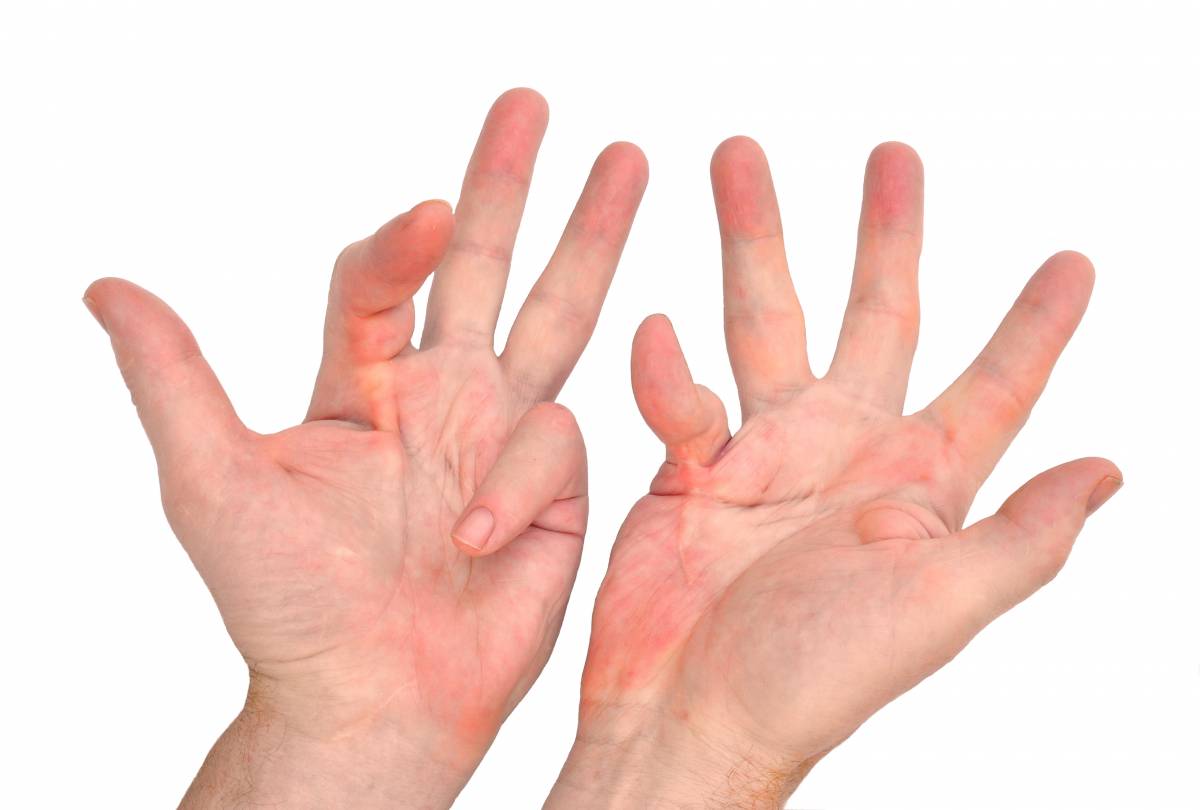Physio's role in treating people's incurable hand condition spelled out in NHS England decision aid
Patients whose hands and fingers have been affected by Dupuytren’s contracture in its early stages have been advised that physiotherapy is not likely to lead to significant improvements.
The advice is contained in one of a set of eight ‘decision aids’ that NHS England released earlier this week (20 July). The eight-page Dupuytren’s contracture decision aid is one of four covering conditions that are likely to be of particular interest to physiotherapists. These are carpal tunnel syndrome, hip osteoarthritis, and knee arthritis.
Though occupational therapists often deliver hand therapy alongside physiotherapists in NHS teams and their roles can overlap, only physiotherapy interventions are mentioned in the advice offered to patients with the incurable condition.

Exercises may help with pain
‘There is little evidence that physiotherapy will help slow the progression of Dupuytren’s contracture. But if you are feeling pain and tension in your hand, exercises may provide some relief,’ the aid states in a section on treatment options for people affected by the condition in its early stages (before the fingers have contracted to an angle of 30 degrees). This section discusses options such as radiotherapy and pain relief.
Elsewhere, the aid discusses treatment options such as needle fasciotomy, open surgery fasciectomy and open surgery dermo fasciectomy. It then offers information on results, such as the number of people who can straighten their fingers a week after each procedure, or the likelihood of the condition returning.
Physiotherapy needed post-surgery
Patients, most of whom will be men, are told: ‘Open surgery on the hand is a major operation. Your wounds should heal within a few weeks of surgery, but full recovery time may take many months. You will need physiotherapy during this recovery period'
'There is no cure yet for Dupuytren’s disease. Treatment can help to straighten your fingers and may improve the use of your hand, but it does not get rid of the disease.'
Next steps
All the decision aids offer links to peer-reviewed articles so that patients can find out about the evidence available in the field, and National Institute for Care and Clinical Excellence guidance is followed. The final page is titled Next steps and offers a box for patients to record the names and contact details of their healthcare professional, and also jot down questions to ask their specialist.
Escape-pain programme for knee osteoarthritis
It’s good to be active and exercise can help with symptoms. Focus on what you enjoy. Group exercise can help such as ‘ESCAPE pain'
The 10-page decision aid on knee osteoarthritis includes a section titled Things I can do for myself, which discusses the potential benefits of ‘being active or exercise programmes. Readers are given a link to an ESCAPE-pain programme: https://escape-pain.org
This will be seen as a considerable feather in the cap for the programme, which was developed by Mike Hurley, a physiotherapist by background. Professor Hurley developed the programme at St George’s University of London and Kingston University to help people with knee, hip and back pain. The ESCAPE-pain programme stands for Enabling Self-Management and Coping with Arthritic Pain using Exercise (ESCAPE).
The NHS England aid notes: 'It’s good to be active and exercise can help with symptoms. Focus on what you enjoy. Group exercise can help such as ‘ESCAPE pain'.
‘Exercise is safe but you should start gradually. It is normal to feel achy and tired at first. If pain and swelling increase or keep you awake at night and this lasts for a few days, then you may have done too much. If this happens, rest for a couple of days and as you feel better, gradually start again.’
Physiotherapists' advice is 'vital'
Patients are assured they will be seen by a physiotherapist after having a knee replacement. The physiotherapist, they learn, will recommend exercises to do at home, which are described as being ‘vital for recovery’.
What doesn't help
Manual therapies, delivered by professionals such as physiotherapists or osteopaths might be worthwhile, but the following treatments are not recommended.
‘There is no good evidence that the following help with knee osteoarthritis: electrotherapies such as TENS machines, acupuncture, insoles or footwear. There is no evidence that they are harmful. There is no good evidence that supplements like glucosamine and chondroitin help with osteoarthritis pain,’ the aid adds.
To download copies of the decision aids, visit: https://www.england.nhs.uk/publication/decision-support-tools-making-a-decision-about-a-health-condition/?s=03
Author: Ian A McMillanShare it with














